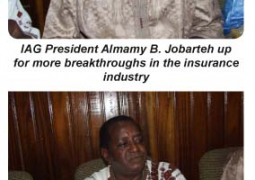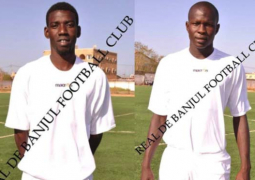The United States Embassy organised a meeting on combating human trafficking presentation for Gambian stakeholders held at the American Corner on
Speaking at the ceremony, Madam Kendra L. Kreide, a Political Affairs Officer, in her presentation, said trafficking in person is modern-day slavery, using force, fraud or coercion to exploit a person for profit and the acts are Recruitment Transfer Transportation Harboring Receipt Provision Obtaining and the means,
By offering potential victims false promises, traffickers paint a rosy picture of a better life, such as a good job, education opportunity, or marriage.
She added that, any person who through force, fraud or conversion is subjected to involuntary servitude, forced labor or commercial sexual exploitation is a trafficking victim.
A girl sold by her parents to a neighboring village, a boy forced to beg on the streets in
Madam Kreider stated that the traffickers are the organised crime, pimps and brothel owners, neighbors, friends, family members, village chiefs, religious teachers, or former victims, businesses owners desiring cheap labour or wanting to lure sex tourists and agricultural operations.
Diplomats and the victims are men, women, and children varying ages varying levels of education and income voluntary migrants or legal residents.
She revealed that in the smuggling of migrants, persons will in many cases risk their lives and their health to brave unsafe conditions.
For the most part; migrants have consented to run the risks and accept the difficulties of reaching another country, the victims of trafficking. On the contrary, they have not consented. Or if they have, their consent is rendered meaningless by coercion, deception, or abuse of power by the trafficker.
For example, they might have consented to take risks to reach another country based on deceptive promises made about the conditions in the destination country, adding that smuggling ends with the migrants’ arrival at their place of destination.
Trafficking involves the ongoing exploitation of the victims, who are usually vulnerable persons in need of protection.
According to her, all 3 Ps are important, and together they serve to help victims, educate the community and provide a deterrent to those who would exploit others.
Prevention efforts educate the community to help make populations less vulnerable to trafficking; protection efforts help victims who are already suffering from situations of human trafficking and prosecution provides a deterrent to would-be traffickers, and sends the message that these actions will not go unpunished.
Without all three, human trafficking will continue. Without the threat of punishment, human traffickers will change their methods to account for the preventative action taken by communities.
Without protections to victims to support them in assisting in prosecutions, law enforcement efforts will not be successful.
And without prevention, vulnerable populations will not learn ways to stay vigilant against traffickers and to protect themselves.



